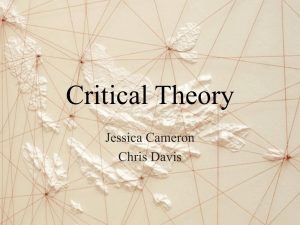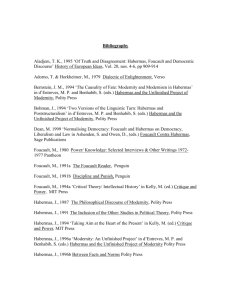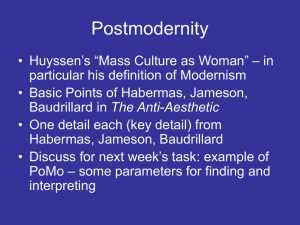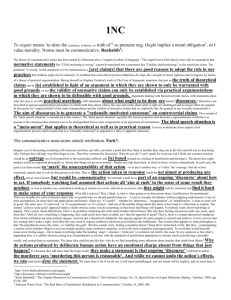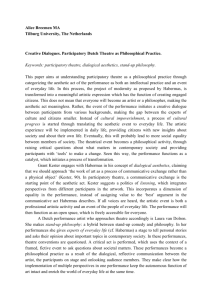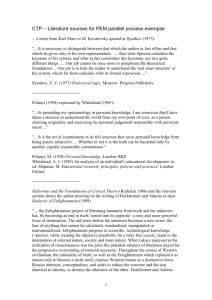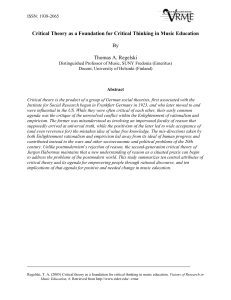Vedrørende Habermas:
advertisement
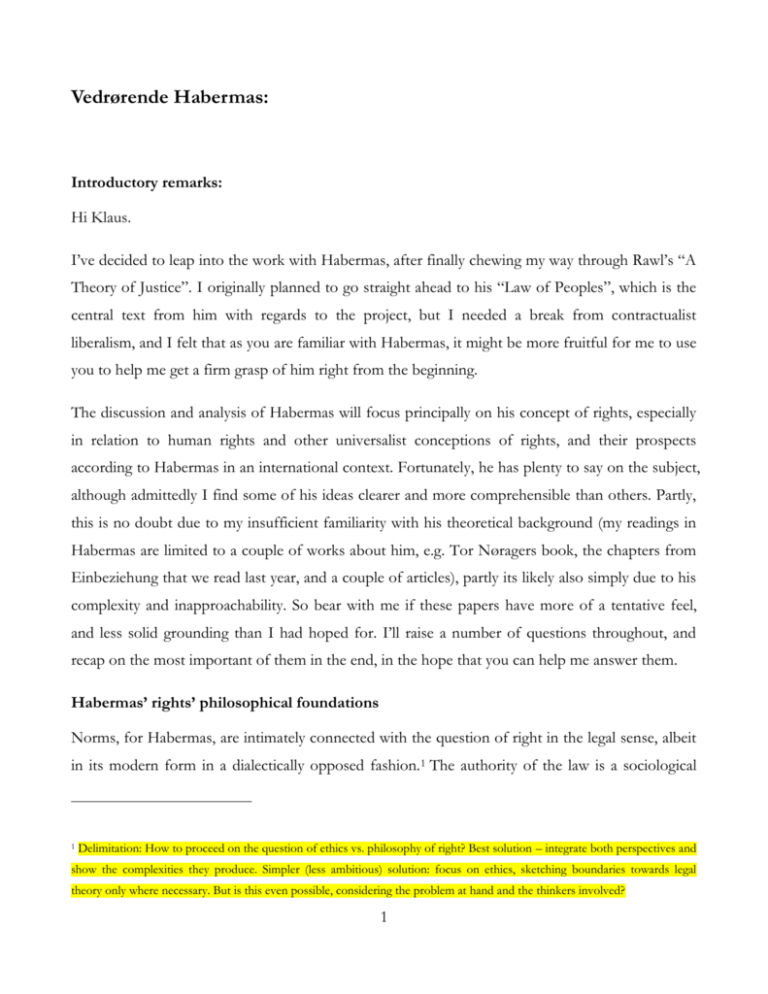
Vedrørende Habermas: Introductory remarks: Hi Klaus. I’ve decided to leap into the work with Habermas, after finally chewing my way through Rawl’s “A Theory of Justice”. I originally planned to go straight ahead to his “Law of Peoples”, which is the central text from him with regards to the project, but I needed a break from contractualist liberalism, and I felt that as you are familiar with Habermas, it might be more fruitful for me to use you to help me get a firm grasp of him right from the beginning. The discussion and analysis of Habermas will focus principally on his concept of rights, especially in relation to human rights and other universalist conceptions of rights, and their prospects according to Habermas in an international context. Fortunately, he has plenty to say on the subject, although admittedly I find some of his ideas clearer and more comprehensible than others. Partly, this is no doubt due to my insufficient familiarity with his theoretical background (my readings in Habermas are limited to a couple of works about him, e.g. Tor Nøragers book, the chapters from Einbeziehung that we read last year, and a couple of articles), partly its likely also simply due to his complexity and inapproachability. So bear with me if these papers have more of a tentative feel, and less solid grounding than I had hoped for. I’ll raise a number of questions throughout, and recap on the most important of them in the end, in the hope that you can help me answer them. Habermas’ rights’ philosophical foundations Norms, for Habermas, are intimately connected with the question of right in the legal sense, albeit in its modern form in a dialectically opposed fashion.1 The authority of the law is a sociological 1 Delimitation: How to proceed on the question of ethics vs. philosophy of right? Best solution – integrate both perspectives and show the complexities they produce. Simpler (less ambitious) solution: focus on ethics, sketching boundaries towards legal theory only where necessary. But is this even possible, considering the problem at hand and the thinkers involved? 1 fact, and to that extent he recognizes the aspirations of sociologists and legal positivists who aim to describe the system of legality without reference to moral justification. But the legal system, like any social system, is subject to both interpretation and change, and such relations to the system must be based in personal values and cultural norms. Hence, the development of his discourseethical theory that, as in the title of his key work on the subject, balances “between facts and norms”. Habermas’ project in “Between Facts and Norms” is to reconstruct the severed link between normativity and legal theory, allowing the objectivity of legal facts to be grounded in and legitimated by the intersubjectivity of social norms. But not any norm will do – Habermas is persistently skeptical of the possibilities of founding normativity in any metaphysical principle. History has, in his opinion, pronounced its final verdict on metaphysics, and the attempt to take point of departure there by tracing normative principles to an a priori foundation has been revealed as futile - hence the necessity of developing a theory of the principles of a postmetaphysical morality that can provide such grounding without falling prey to the troubles that assailed the normativity of enlightenment philosophy. Not decidedly anti-metaphysical (e.g. in the positivist sense), Habermas considers his own philosophy “post-metaphysical”, signifying that although skeptical of the approach of idealist philosophy, he remains sympathetic to its ambition and focus – it is not the aim of codifying and justifying universal norms that has to be abandoned, but the metaphysical route by which philosophy has attempted to reach the goal. Additionally, he distinguishes sharply between the type of means-ends calculations characteristic of consequentialist theories and what he defines as moral proper: “In contrast to ethical deliberations, which are oriented to the telos of my/our own good (or not misspent) life, moral deliberations require a perspective freed of all egocentrism or ethnocentrism. Under the moral viewpoint of equal respect for each person and equal consideration for the interests of all, the henceforth sharply focused normative claims of legitimately regulated interpersonal relationships are sucked into a whirlpool of problematization.” (Habermas, 2004, 97) I.e. ethical is oriented towards hypothetical judgements – means-ends relations, but the particular means-ends relations focused on an end-goal of the good, subjectively or intersubjectively, whereas morality is oriented towards categorical judgements, made from a 2 perspective of personal- and ends-neutrality. The status of universal rights in Habermas’ philosophy Habermas traces back the central crisis of legitimation and the derived difficulties in providing rights with a normative foundation to the schism implicit in the Enlightenment conception of autonomy between self-rule and self-legislation, that is between the freedom of the autonomous subject to act as an individual and the responsibility of same subject to restrict its actions with respect to the freedoms of others. This divide is archetypically exemplified by the emphasis placed on individual freedom and republican sovereignty by respectively Kant and Rousseau: “If the rational will can take shape only in the individual subject, then the individual’s moral autonomy must reach through the political autonomy of the united will of all in order to secure the private autonomy of each in advance via natural law. If the rational will can take shape only in the macrosubject of a people or nation, then political autonomy must be understood as the selfconscious realization of the ethical substance of a concrete community; and private autonomy is protected from the overpowering force of political autonomy only by the nondiscriminatory form of general laws.” (Habermas, 2004, 103) In Kant’s works, law and the rights institutionalized in it derives its legitimacy by expressing a norm set by the requirements of the moral law for the freedoms of autonomous subjects. Whereas in Rousseau, law and the freedoms institutionalized therein derives its legitimacy by being the result of the self-legislation of autonomous subjects formalizing their desired freedoms. Habermas is sympathetic to the later interpretation, albeit not in its original form. Because Rousseau presupposes a homogeneity between the relevant subjects that is unlikely to exist in the real world: “He thus cannot explain how the normatively construed common will can, without repression, be mediated with the free choice of individuals. This would require a genuinely moral standpoint that would allow individuals to look beyond what is good for them and examine what lies equally in the interest of each.” (Habermas, 2004, 102) In modern times this develops into a schism that forces one to choose sides between liberalism and republicanism: “Liberals invoke the danger of a “tyranny of the majority” and postulate the priority of human rights that guarantee the prepolitical liberties of the individual and set limits on 3 the sovereign will of the political legislator. The proponents of a civic republicanism, on the contrary, emphasize the intrinsic, noninstrumentalizable value of civic self-organization, so that human rights have a binding character for a political community only as elements of their own consciously appropriated tradition.” (Habermas, 2004, 100) This failure in providing a satisfactory justificatory scheme for such essential conceptions as public sovereignty and individual rights, in Habermas’ analysis, forces us to revise the premises of Enlightenment normativity in the search of a different, postmetaphysical approach that can provide the required grounding: “[The] failure of foundationalism recommends a pragmatic conception of justification as a public practice in which criticizable validity claims can be defended with good reasons.” (Inclusion, 37) But before we turn to Habermas’ attempt at developing this idea into his discourse-ethics, it is worth taking a closer look also at the conception of rights proper and the way that the development in legal theory further illustrates the complexities of the problem as well as the dire need of a solution. Habermas’ typology of right Habermas distinguishes between a number of different, influential conceptions of right in German legal theory, which I believe it is not unreasonable to see as prototypes for a wider classification into quasi-Weberian “idealtypes” (check term in English and back this claim up!) The first relevant type is the private law of the early nineteenth century, classic of traditional liberalism in its focus on the inviolability of individual negative freedoms: “According to this view, rights are negative rights that protect spheres of action by grounding actionable claims that others refrain from unpermitted interventions in the freedom, life and property of the individual. Private autonomy is secured in these legally protected spheres primarily through contract and property rights.”(Habermas, 2004, 85) Grounded as it was in natural law, this conception could not endure the crisis of metaphysics and the accompanying removal of the moral grounding in a transcendental order of autonomous subjects bound by the objective law of reason. The result was the turn to positivist conceptions of right, culminating with Kelsen, where law established right through the objective will embodied in the legal order: “[L]egal norms establish prescriptions and permissions having the character of an 4 “ought.” This illocutionary “ought” however, is understood not in a deontological but in an empirical sense, as the actual validity that political lawgivers confer on their decisions by coupling enacted law with penal norms. The coercive power of state sanctions qualifies the lawgivers’ will to become the “will of the state.”(Habermas, 2004, 86) But this positivist conception itself encounters two problems: first of all, rights are not properly conceptualized if viewed as subjective rights in the sense that they refer to and relate atomist individuals. They must be conceived as fundamentally cooperative, part of a social order in which individuals relate to and mutually grant each other rights by constituting a legal order: “[A]s elements of the legal order [rights] presuppose collaboration among subjects who recognize one another, in their reciprocally related rights and duties, as free and equal citizens. […] In this sense “subjective” rights emerge co-originally with “objective” law…” (Habermas, 2004, 88f) Second, it fails to properly ground right, in that when lead to its formalist conclusions, the legal subject itself dissolves as the legitimating foundation of rights, becoming an abstraction, an empty holder of them defined only in terms of these legal rights, which not only leads to positively odd tautologies, but also removes the original basis for the legal order: “To be sure, the source of all legitimacy lies in the democratic lawmaking process, and this in turn calls on the principle of popular sovereignty. But the legal positivism, or Gesetzespositivismus, propounded in the Weimar period by professors of public law does not introduce this principle in such a way that the intrinsic moral content of the classical liberties[…] could be preserved.” (Habermas, 2004, 89) This leads Habermas to turn in a different direction to seek the elusive goal of a post-metaphysical grounding for the legal order that can legitimate subjective rights not founded in the legal order itself. His solution is to universalize the required rights that will guarantee the process by which legitimate communities are constituted in a reasonable dialogue, focusing on the process of deliberation and the ethics of discourse. Discourse-ethics – in 3 (not-so-) easy steps A central feature of normativity for Habermas, part of his Kantian legacy, is the concept of the rational subject as autonomous in the sense that the individual is self-legislative. This means that it is not only the object of the laws set down by reason, but also the author of these laws, instituting 5 them through the use of and in correspondence with reason. This, however, is not unproblematic given the fact that we can no longer subscribe to the extensive anthropology of Enlightenment philosophy with its belief that it was possible to define substantial conceptions of the good life that were preferable on the basis of reason: “[Kant] tacitly assumes that in making moral judgments each individual can project himself sufficiently into the situation of everyone else through his own imagination. But when the participants can no longer rely on a transcendental preunderstanding grounded in more or less homogenous conditions of life and interests, the moral point of view can only be realized under conditions of communication that ensure that everyone tests the acceptability of a norm, implemented in a general practice, also from the perspective of his own understanding of himself and of the world. In this way the categorical imperative receives a discourse-theoretical interpretation in which its place is taken by the discourse principle (D), according to which only those norms can claim validity that could meet with the agreement of all those concerned in their capacity as participants in a practical discourse.” (Inclusion, 33f) The normative challenge that Habermas rises to meet is thus that the parties in a given situation must be able to assume the perspective of the universal, rather than their own or any given preference with respect to conceptions of the good, disregarding their own preferences and values. But rather than attempting to realize this abstractly as a transcendental challenge, Habermas insists on relocating the issue into the concrete context of the lifeworlds at stake: Normativity becomes the obligation to pursue the construction of mutually agreeable values and regulations of cooperation through rational dialogue. The dissolution of difference in favour of a universal homogenous rational norm is abandoned in favour of the establishment of a common understanding that can provide the basis of peaceful and prosperous coexistence under terms defined by the parties in question. The Discourse principle itself is defined as: “(D) Only those norms can claim validity that could meet with the acceptance of all concerned in practical discourse.” (Inclusion, 41) And is to be supplemented by the principle of universalizability: “(U) A norm is valid when the foreseeable consequences and side effects of its general observance for the interests and value-orientations of each individual could be jointly accepted by all concerned without coercion.” (Inclusion, 42) These two, and the derivable requirements for the dialogue that makes such discourse possible, 6 enjoy special status accordingly. Thus, in a sort of post-metaphysical transcendental analysis, Habermas designates the principles that make the use of public autonomy possible to be natural rights, as only the application of and respect for these, makes the rational discourse and communal self-legislation of individuals possible. This ties the normative issues to a wider theory of the just social order, bringing Habermas’ work into close correlation with that of John Rawls, and thus it is not surprising that Habermas has commented extensively on what he perceives as the strengths and weaknesses of Rawls’ approach. Habermas on Rawls In both Habermas’ and Rawls’ political philosophy, the fundamental legitimacy of a societal order relies on its allowing the individual to exercise autonomy, both in the sense of freedom from oppression, unjust imprisonment, etc., and the freedom to exercise its capacity for regulating the direction of its own life-path and the shape and development of the community in which the individual lives. The freedoms entailed are thus by no means to be understood in the narrow negative sense, as freedom from the illegitimate interference with the personal liberty of the individual, but should, on the contrary, be understood as realizing autonomy only once the individual is granted an actual possibility of taking part in setting the direction of its own life as part of a community of similarly endowed individuals. Habermas succinctly sums up Rawls’ approach: “In his Theory of Justice, Rawls developed the idea of a “well-ordered” society under the conditions of modern life. This is a system that makes possible the just cooperation of free and equal citizens. The basic institutions of such a society must be set up according to a scheme that deserves the rationally motivated assent of all citizens because it can be grounded in justice as fairness. In grounding the two highest principles of justice, Rawls follows the social-contract model. He proposes a procedure that can be understood as explicating the point of view for an impartial judgment of morally substantive questions of political justice. In the “original position” the parties involved in the process of justification are subject to precisely those restrictions (including, inter alia, equality, independence, and ignorance of one’s own position in a future society) that guarantee that all arrangements grounded in purposive-rational considerations are at the same time in the interest of all parties, and hence can be accepted as right or just in the 7 normative sense. (Habermas, 2004, 57f) But exactly because Habermas remains sceptical of the possibility of generating substantial universal norms, capable of guiding our social orders irrespective of the variations of the lifeworlds involved, he cannot accept Rawls’ suggestion of using an original position. In a related passage on the difficulties of combining universal norms with multicultural contexts, he comments that: “For any attempt to project a universally binding collective good on which the solidarity of all human beings – including future generations – could be founded runs up against a dilemma: a substantive conception that is still sufficiently informative entails an intolerable form of paternalism (at least with regard to the happiness of future generations); but an empty conception that abstracts from all local contexts undermines the concept of the good.” (Inclusion, 28) Thus, for Habermas, the solution is not one to be reached once-and-for-all by philosophers using any specific set of guidelines, but the determination of a procedure that when applied in real-life contexts will generate justified solutions for the parties involved. Contrary to Rawls, it is not sufficient that norms are constructed on the basis of principles of reason, whether in the shape of transcendental laws or original-position contracts, that make them principally universal. It is rather necessary that they are constructed in a process which ensures that the relevant parties can access a universalizable (in the context of the relevant parties) agreement. This self-legislation in action, however, presupposes the reasonable, or in Habermas’ terms “herredømme-fri” (English-term!) debate, where, in true dialogical fashion, it is possible for the involved individuals to develop their own perceptions through the meeting with ”the other”. A central characteristic of the just social order is therefore that it is one wherein: ”[Citizens] suppose that their political opinions may be revised by discussion with other citizens.” (reference: Inclusion!) Citizenship and the inclusion of the other The problem that has received the majority of Habermas’ attention in the discussion of citizenship has been the question of what role national patriotism and cultural heteronomy should play in the forming of legitimate groups, especially in relation to the discussion of multiculturalist societies in Europe and the challenges they face. His position on this is reasonably clear: Lacking an ontological grounding (e.g. in the form of the substantial concept of culture, or the entity of the 8 nation) there are no justifiable principles for inclusion/exclusion on the basis of nationality and culture: ”Equal respect for everyone is not limited to those who are like us; it extends to the person of the other in his or her otherness. And solidarity with the other as one of us refers to the flexible “we” of a community that resists all substantive determinations and extends its permeable boundaries ever further. This moral community constitutes itself solely by way of the negative idea of abolishing discrimination and harm and of extending relations of mutual recognition to include marginalized men and women. The community thus constructively outlined is not a collective that would force its homogenized members to affirm its distinctiveness. Here inclusion does not imply locking members into a community that closes itself off from others. The “inclusion of the other” means rather that the boundaries of the community are open for all, also and most especially for those who are strangers to one another and want to remain strangers.”2 As such, discourse-ethics makes strong claims on states as regards policies of immigration and integration, although it is tempered with realist perspectives of the necessity to moderate such claims so as not to overburden European states with economic and socio-cultural challenges. 3 (reference/quote: End of Multiculturalism-essay!) However, it is both possible to generalize from this more limited scope of attention to the more extensive problems at hand, as well as to find occasions where Habermas himself addresses these issues: “From the fact that persons can only be individuated through socialization it follows that moral concern is owed equally to persons both as irreplaceable individuals and as members of the community, and hence it connects justice with solidarity. Equal treatment means equal treatment of unequals who are nonetheless aware of their interdependence. Moral universalism must not take into account the aspect of equality – the fact that persons as such are equal to all other persons – at the expense of the aspect of individuality – the fact that as individuals they are at the same time absolutely different from all others.” (Inclusion, 40) 2 Habermas, ”Inclusion”, Preface p.xxxvf 3 Reference: Habermas in section 2 on multiculturalism – is there going to be one? If so, how to delimit it in relation to this section? Perhaps a section on multiculturalist societies, with each of the relevant actors, instead? 9 Two questions for Habermas: 1) The return of the repressed metaphysics: It is not clear to me what the basis of the legitimacy of the principles for rational discourse is. Habermas seems to suggest that these at least can be given the status of true moral norms, in the sense that they are universal prior to the constitution of any particular community and the results of the debate of any such community. But, if taken to its extreme, mightn’t one ask: “Even though these may be the requisite rules for any legitimate social interaction that is to produce justifiable norms, what gives them the driving force that we should accept them in favour of unreasonable social interaction, or the simple rejection of the constitution of a social order at all?” 2) Defining relevant communities: One of the most crucial problems, if not the most crucial, for the theories I’m investigating for this thesis is how to define the relevant legal/normative community. Despite Habermas’ comments on this in relation to issues of inclusion/exclusion, it still isn’t clear to me how he intends to draw the line, or indeed this is even possible as anything but a pragmatic solution if his system is to be coherent? Yet, I feel that he would prefer not to be labeled as a full-blown cosmopolitanist, alongside e.g. David Held, and if so he certainly needs a method of demarcation. 10

